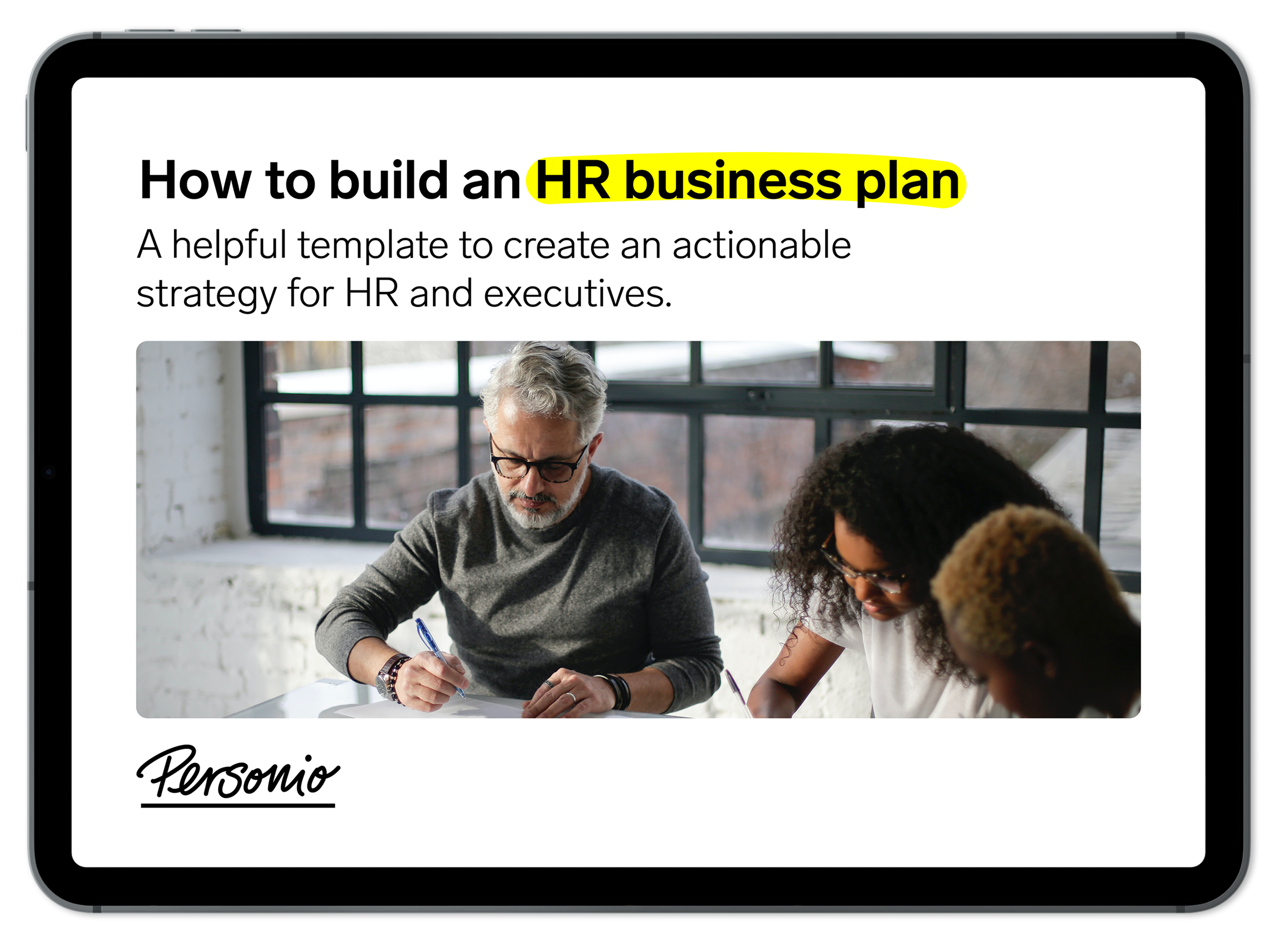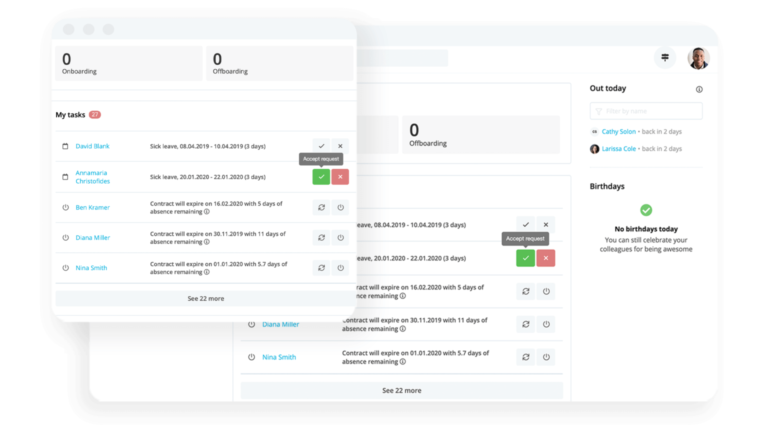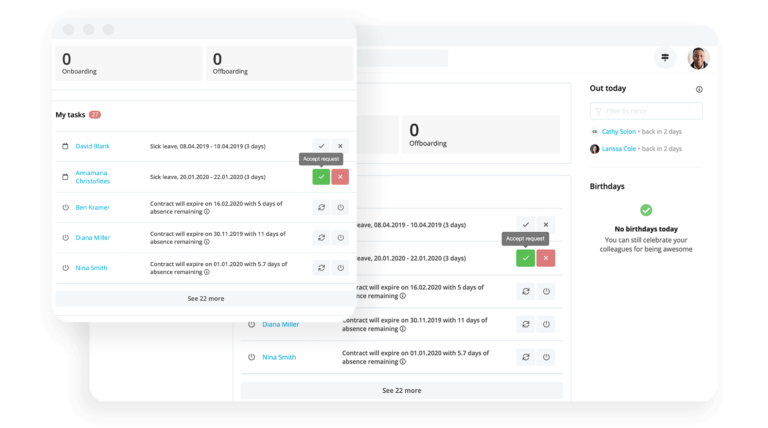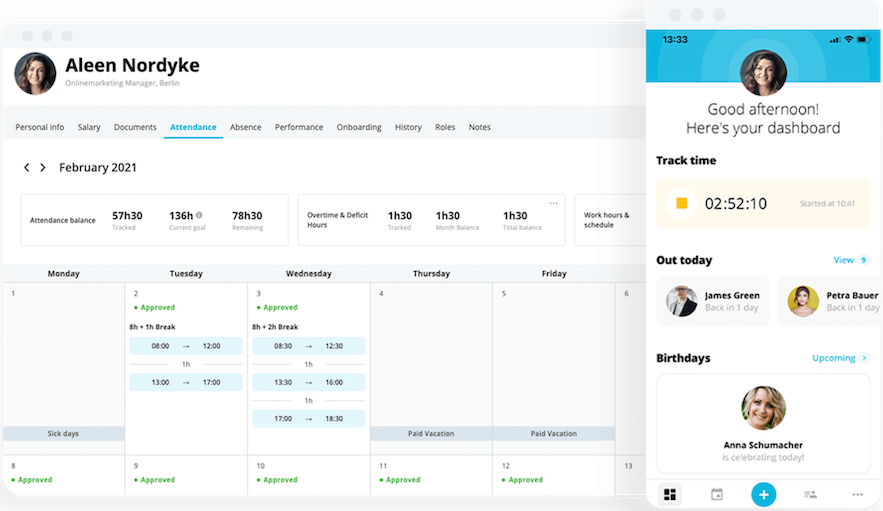The 5 HR Processes Every Small Business Should Get Right

HR for small businesses, especially those in the UK, plays a key role in helping your company grow. Whether you are a founder, an executive member or a team’s first HR hire, it truly helps to build up a foundation for HR success.
To help your small business grow, we’d recommend the following five HR processes to help successful businesses scale their operations. Here is where you should focus…
Book a demo to see why 15,000 companies trust Personio with their HR work.How Does HR Work in Small Businesses?
In a business of just about any size, an HR team is going to be in charge of what is known as the employee lifecycle. This is the journey of how employees enter, and ultimately exit, an organisation. It consists of six stages:
Attraction
Recruitment
Onboarding
Retention
Development
Separation
Whoever is in charge of HR is going to be in charge, whether they know it or not, of each of these stages. So, having streamlined processes is imperative.
Think about it like this: Each lifecycle stage, at a bare minimum, may consist of two to three separate processes. In an organisation of even 10 people, that equates to 10 people relying on two processes per stage, to a total of 20 processes per employee.
Across even your small business, that is 200 processes that someone needs to manage. So, whether it’s an HR Director, a Founder or no one at all, that’s a lot to manage. And, as you grow, that number only increases exponentially.
Is HR Necessary for Small Businesses?
The fact is that, when it comes to HR for small businesses, any decision your HR team (or the person in charge of HR) makes can have an outsized impact on your organisation.
Chalk it up to a smaller headcount. When you have less people, you can affect them more quickly, but even your small decisions may have big-time consequences.
This is going to look different for every small business. Ultimately, your people are your most important asset, and your HR work can help keep them happy, engaged and productive.
What if a Small Business Doesn’t Have HR?
While your small business doesn’t need to have a full-fledged HR department out of the gate, it is massively important to have some sort of idea of how you will manage your people processes. That’s due to both compliance and productivity.
Your employees crave structure. This is true not only in their core work, but in how they experience your organisation. You need to give them rules to play by, processes to follow and the knowledge they need to succeed.
HR can help with all of these things. Teams that don’t have HR, or at least a focus on it or a tool in place, risk sacrificing their growth plans from their very inception.
Help your HRBP to unlock executive buy-in

Download our HR Business Plan Template to help your HRBP pull together a plan that earns executive support.
Get the templateThe Top 5 Most Important HR Processes for Small Businesses
Let’s get to it! Here are the top five most important HR processes that small businesses should get right from the start…
1. Smooth & Successful Onboarding
A great start leads to a great career! Especially as a small business, you rely on your employees to be rockstars in everything they do – they will help you grow and will help your business scale over time. You need them to have a great start.
The onboarding process is where all of that happens. It is where employees get up to speed, learn how to succeed in their role and also help out the organisation by providing any and all important documents (like right to work documents, for instance).
First on your list should be to list out all of the steps of your onboarding process. If you don’t know where to start, we can recommend this handy checklist. Then, you need to affix due dates to these steps and also make sure to remind people to complete them.
Ultimately, onboarding is truly a team effort. You need your entire team to guarantee a great start for your new employees.
So, having a way to streamline your onboarding can make a world of difference – so you can focus on the quality of the work, and not the quantity of the tasks.
2. Data Collection, Protection and Storage
Speaking of onboarding, we touched on this idea in the previous step, but it’s truly imperative to have all of your employee documents in order. This isn’t true simply for onboarding.
Life happens. We know that, and we know that as things change, people may need to make updates to their core employment documents. Maybe they change banks, get married, move homes, or something in between.
One of the key HR processes that small businesses need to lock down is how they manage and store important employee data and information. Where do they keep it? How safe is it kept? How involved are employees in submitting their own information?
Data compliance is one thing. Another is asking a busy CEO or HR Director to manage all of that paperwork, and see to it that it is filed and stored accordingly. For any employee, much less a busy one, this can be a monumental task.
That’s why, for small businesses, digital employee files are such a game-changer. They offer a place to store crucial information, without the stress of compromised data, while allowing employees to submit their own changes.
In short, data only grows over time. An organisation of any size is going to keep all of their data in one place – whether they are large or small.
3. Planning, Request and Tracking Holiday
One of the most stressful HR processes for small businesses has to be tracking holiday. Many organisations already know about the dreaded Excel sheet.
Prone to being broken, extremely cumbersome to use, incredibly unclear – employees may avoid your holiday tracking sheet like the plague. No matter how many people use it daily.
And, it makes the lives of line managers even harder. Who’s in? Who’s out? If you can’t visualise this in an easy-to-understand way, you may as well not have it.
Holiday is one of the biggest stressors for organisations of any size. Small businesses especially need a system that tracks absences from the very start – offering ways for employees to request, managers to approve and executives to track absences.
It’s a small but mandatory upgrade, but it makes a world of difference. Tracking holiday should be simple, and it should be easy for managers to see and understand.
15,000 organisations trust Personio for this reason

Just like LUSH and Premier Inn, trust Personio's all-in-one HRIS to upgrade your people operations for now and into the future. Click below to learn more about us.
Book Your Demo4. Performance Chats & Employee Growth
Every employee deserves to grow in their role. And, especially for small businesses, your HR work can be a critical enabler in helping your organisation grow quickly.
Many leaders find performance chats incredibly difficult to manage. So much so, that many of them jettison these chats entirely. But, is that the right way to go?
Of course not. There is a direct correlation between employee performance reviews and employee engagement and productivity. When employees feel themselves being evaluated, fairly and productively, they do the best work of their careers.
But, the reason performance chats don’t happen is not for lack of trying. The process itself, even trying to find the time amongst 10 different people, can be incredibly taxing.
Performance management cycles are no joke. Even small businesses need performance management software that helps automate these cycles, create structured ways to hold these discussions, so they can focus on the quality of the conversation.
The main thing you want to avoid is a cumbersome, delayed or completely forgotten performance review. This is a process you need to do correctly.
5. All Those HR Bits & Bobs
Especially if your HR is being run solely by a founder, a CEO or a busy HR director, there’s a lot that can go under the radar. All those bits and bobs add up very quickly.
This is more about ‘process clean-up’ rather than a process itself, but it really matters to get those fundamental practices correct. It can elevate your entire organisation.
Think about it in the form of something like workflow automation. Or, electronic signatures. It’s the small things that make your processes run so much smoother.
Let’s think about it like this: What about sending your employee handbook to a new employee before they start? Or, sending a birthday reminder to the entire team automatically?
Maybe it’s as simple as requesting time off or a sick day from a mobile phone. Or, tracking time working from your mobile, too.
A solid foundation helps ensure that all of these things never go missing, never go unaddressed and instead are used to the advantage of your small business.
Finding HR Software for Small Businesses
It all comes down to focus. As a small business owner or leader, you are focused on growing your business and ensuring things run smoothly. And, the last thing you want is seeing your processes slip or your people become less engaged (and less productive).
What you need is support. Support in the form of an HR software that can help elevate all of your work, and provide a foundation for growth now and into the future. Something that upgrades your people operations, and gets the basis exactly right.
We’d like to introduce you to Personio. Our all-in-one HR software can help ensure that your small business, as it grows, gets all of the HR fundamentals correct – taking things away that you don’t want to manage, and helping you focus on what will drive business.
The Top Benefits of HR Software for Small Businesses
Everything in one place – All of your employee data, stored securely and easy-to-update for managers and employees alike.
On top of everything – Tracking time, requesting holiday, you’ll never miss a beat because everything is housed in one system.
Engaged, productive employees – A system that takes your employees to heart helps them use it, update it and get back to doing their best work.
Built to grow - A solid foundation that grows with the needs of your business. A system that scales in function in line with your headcount.
Speak with one of our helpful experts today. They’ll get to know your needs, ask all the right questions and find out if what you need is an HR software for your small business.

